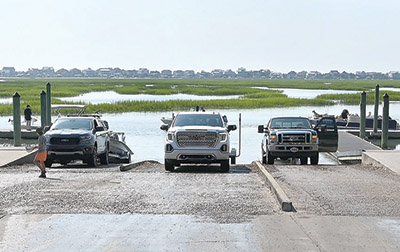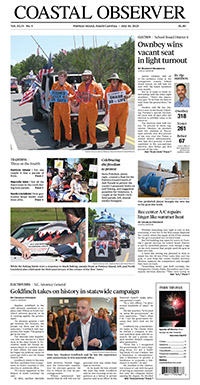Recreation
Charter captain asks county to relax ban on commercial activity

A charter boat operator has put his part-time business on hold while Georgetown County decides how it will enforce a long-time and long-ignored ban on commercial activity at public boat landings.
“My business is shut down due to the sudden enforcement of a 30-year-old county ordinance,” Paul Kenny told County Council this week.
Deputies began writing tickets at the Murrells Inlet Boat Landing last month under a 1991 ordinance that bans commercial activities at county landings. That includes taking on passengers and cargo. Sheriff Carter Weaver said he thinks the ordinance is too broad and wants the council to amend it.
Kenny started offering fishing charters in 2011 as a sideline while he worked at the University of South Carolina’s Baruch Marine Lab, where he also operated boats.
He told the council that he talked to other guides about the ordinance before he started because he needs to use the county boat ramps.
“They all indicated that it was not enforced and others were not aware of it,” he said.
He also pointed out that the Coast Guard had put up signs at landings with rules for hiring boats.
“Hagley Landing was historically used for commercial purposes,” Kenny said.
A ferry carried passengers from Georgetown, where they were able to take a train to Pawleys Island. The historic use of Hagley was also raised in a 1991 lawsuit by a tour boat operator who tried to use the landing. Capt. Sandy Vermont was barred running tours there because it was a commercial operation in a residential zoning district.
The county then adopted the ordinance governing its boat landings. Vermont asked the courts to prevent the county from enforcing the ordinance, saying it violated the state Constitution’s provision that navigable waterways are “public highways.”
The state Supreme Court upheld the ordinance, saying the county had legitimate concerns for overcrowding, limited parking and safety.
It was another tour boat that prompted the county’s enforcement of the ordinance.
Rover Tours was cited by the city of Georgetown for operating from the landing at East Bay Park. The city obtained a temporary injunction in Circuit Court last month. This week, the injunction was made permanent when the operator, Tamela Walter, failed to respond to a suit by the city claiming the operation constituted a nuisance.
Walter also tried to use the county’s Carroll Campbell Landing on the other side of the Georgetown harbor, but was told by deputies to leave.
Walter’s attorney, Angela Lane, said at a court hearing that the city was ignoring the fishing charters that operate from East Bay and accused it of “selective enforcement.”
Chris Spigner, a Georgetown resident, asked the council this week to stop enforcing county ordinance until it can be revised. She said that people she knows whose business depends on the use of the landings are scared.
“This affects too many with loss of income, unemployment for many, and most importantly the loss of tourism revenue that these businesses bring in to our county,” she said.
If the issue is liability, something cited in the city’s case against Rover Tours, she suggested that the county obtain waivers from commercial users. “It’s got to be something that can be done quickly,” Spigner said.
She said afterward that she knows a couple of people who received tickets.
“I have lots of friends with small businesses who operate boats. I’m very concerned for my friends,” she said. “You can’t have selective enforcement, that’s not fair.”
Kenny started operating history and ecology tours a couple of years ago with the local historian Lee Brockington. Those are also on hold.
“The effect of enforcing this ordinance is devastating on many fronts. If enforced at face value, commercial fish operators, charter guides, tour operators, kayak outfitters, boat dealers and competitions are out of business. The negative effect on tourism will be great,” Kenny told the council.
Council Member Bob Anderson said he plans to meet with Weaver and the county attorney to review the ordinance. He questioned the need to change it since it hasn’t been a problem until recently.
Spigner said she was “enraged” by Anderson’s statement that the ordinance wasn’t broke.
She and Kenny both asked the county to stay enforcement of the ordinance.
“There appears to be a consensus to fix this problem and I urge you to do so as soon as possible,” Kenny said.
He also noted that the county had the opportunity to deal with concerns about Hagley Landing 20 years ago when it was offered money by the Litchfield Co. to buy nearby property as mitigation for the company’s development of a marina at Willbrook Plantation.
“The county sided with the POA and parking for the ramp remains on the side of the road,” Kenny said.
Public access to the boat ramp at the marina, now Safe Harbor Reserve Harbor, was provided instead.
Last month, the marina announced that it planned to close the ramp to the public.
But a spokeswoman for the state Department of Heath and Environmental Control said the public access is included in the federal permit for the marina and any change would require approval from the agency.




